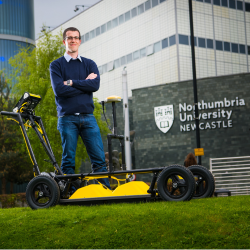-
Study
-
UCAS Clearing 2024
- Clearing Courses
- The Clearing Process
- UCAS Tariff Points
- Clearing 2024 FAQs
- Confirmation
- Clearing Virtual Event
-
Undergraduate
- Search for a Course
- Undergraduate Open Day & Events
- Application Guides
- Northumbria University UCAS Exhibitions
- Foundation Years
- Undergraduate Fees & Funding
- School & College Outreach
- Continuing Professional Development
-
Postgraduate
- Postgraduate Study Degree
- Postgraduate Research Degrees
- Postgraduate Open Days and Events
- Postgraduate Fees & Funding
- Flexible Learning
- Thinking about a Masters?
- Continuing Professional Development
- Change Direction
-
Student Life
- The Hub - Student Blog
- Accommodation
- Life in Newcastle
- Support for Students
- Careers
- Information for Parents
- Students' Union
- Northumbria Sport
-
-
International
International
Northumbria’s global footprint touches every continent across the world, through our global partnerships across 17 institutions in 10 countries, to our 277,000 strong alumni community and 150 recruitment partners – we prepare our students for the challenges of tomorrow. Discover more about how to join Northumbria’s global family or our partnerships.
View our Global Footprint-
Applying to Northumbria
- European Union
- Our London Campus
- Northumbria Pathway
- International Events
- Entry Requirements and Country Representatives
- Regional Offices
-
Northumbria Language Centre
- Faculty Requirements
- Acceptable English Requirements
- Pre-Sessional English and Study Skills
- Academic Language Skills Programmes (ALS)
-
International Fees, Funding & Scholarships
- International Undergraduate Fees
- International Undergraduate Funding
- International Masters Fees
- International Masters Funding
- International Postgraduate Research Fees
- International Postgraduate Research Funding
- International Money Matters
-
Life at Northumbria
- International student support
- Careers
-
International Mobility
- Current Northumbria Students
- Incoming Exchange Students
-
-
Business
Business
The world is changing faster than ever before. The future is there to be won by organisations who find ways to turn today's possibilities into tomorrows competitive edge. In a connected world, collaboration can be the key to success.
More on our Business Services -
Research
Research
Northumbria is a research-rich, business-focused, professional university with a global reputation for academic quality. We conduct ground-breaking research that is responsive to the science & technology, health & well being, economic and social and arts & cultural needs for the communities
Discover more about our Research -
About Us
-
About Northumbria
- Our Strategy
- Our Staff
- Place and Partnerships
- Student Profiles
- Alumni Profiles
- Leadership & Governance
- Academic Departments
- University Services
- History of Northumbria
- Contact us
- Online Shop
-
-
Alumni
Alumni
Northumbria University is renowned for the calibre of its business-ready graduates. Our alumni network has over 237,000 graduates based in 178 countries worldwide in a range of sectors, our alumni are making a real impact on the world.
Our Alumni - Work For Us
What will I learn on this module?
You will learn the management theories and systems used throughout the design, construction and operational phases of a building. This will include the implications of design decisions and construction processes and the impact such decisions have on construction and operational costs, including life cycle costing, cost planning and value engineering. You will learn how to work both individually and as part of a team to carry out building surveys and produce feasibility reports for real commercial projects. On completion of the module, your improved ability to link theory, practice and application will serve to enhance your future employment prospects.
How will I learn on this module?
You will learn through a combination of lectures, seminars, local case study buildings, self-directed study and presentations. Lectures and seminars will be used to reinforce and focus on key issues, concepts and techniques acting as a framework for professional surveying practice. You will take part in practical building surveys that will reinforce management theories and further reinforce health and safety aspects of on-site surveying. A major part of your learning is by attending, observing and then participating in presentations made by students within your cohort ensuring a wide exposure to building feasibility solutions. The presentations will enable you to develop your ability to work effectively as part of a group or team, which is very important in relation to future employability.
If you are in employment your workplace will be the main learning environment, in effect acting as a framework for design and construction economics. However, tutor support will be available via drop-in sessions throughout the module study period. If you are in employment it is recognised that there is the need for modes of blended learning delivery, experiential assessment, and opportunities to combine work and study through independent study, embedded learning opportunities, and relevant communications technologies. Lecture capture will be used to elaborate on the content contained in any teaching material along with audio recording and notes to support presentations on key topics.
How will I be supported academically on this module?
During field surveys you will engage in small group activities during which you will benefit from peer interaction and support. In these sessions, you will also interact closely with teaching staff, who will provide formative support and feedback on activities leading up to the assessment tasks.
You will also be supported by the provision of on-line resources via the module e-learning portal. These resources include lecture and workshop information, interactive reading list with on-line access to a number of key articles. Teaching staff will also respond to individual questions via the module’s discussion board so that everyone taking the module can benefit. Staff teaching on the module have an ‘open door’ approach during normal working hours and are responsive to communication via e-mail to support your learning.
If you are in employment your workplace will be the main learning environment, however, tutor support will be available via drop-in sessions throughout the module study period. The eLP, telephone and email will be used as a means of communication once the initial briefings have taken place and work-based visits will be made by tutors if appropriate.
What will I be expected to read on this module?
All modules at Northumbria include a range of reading materials that students are expected to engage with. The reading list for this module can be found at: http://readinglists.northumbria.ac.uk
(Reading List service online guide for academic staff this containing contact details for the Reading List team – http://library.northumbria.ac.uk/readinglists)
Bouchlaghem, D., Dowdle, D. & Ahmed, V. (2006) Teaching and learning building design and construction. Earthscan
Douglas, J. (2006) Building Adaptation.2nd Edn. Butterworth-Heinemann
Eynon, J. (2013) The design manager’s handbook. John Wiley & Sons Ltd.
Harris, F., McCaffer, R., Edum-Fotwe, F. (2006) Modern Construction Management. 6th Edn. Blackwell.
Myers, D. (2008) Construction economics: a new approach. Taylor & Francis.
Oakland, J. & Marosszeky, M. (2006) Total Quality in the Construction Supply Chain. Butterworth-Heinemann.
Remoy, H.T., & Wilkinson, S.J. (2012) ‘Office building conversion and sustainable adaptation: a comparative study’. Property Management, Vol.30, No.3,pp. 218-231.
Walker, A. (2007) Project Management in Construction. 5th Edn. Blackwell Publishing.
Weatherhead, M., Owen, K., & Hall, C. (2005) Integrating value and risk in construction. CIRIA
Wilkinson, S.,Remoy, H.T. & Langston, C.A. (2014) Innovation in the built environment. Wiley Blackwell.
William, T. (2010) Construction management: emerging trends and technologies. Delmar Cengage Learning.
What will I be expected to achieve?
Knowledge & Understanding:
• MLO1
You will be able to analyse management and organisational theories, practices and strategies provided in case study materials and produce appropriate reports.
• MLO2
You will be able to evaluate quality management systems and processes provided in case study materials and produce appropriate professional reports.
• MLO3
You will be able to evaluate risk management principles, cost planning and life cycle costs provided in case study materials and produce appropriate professional reports.
Intellectual / Professional skills & abilities:
• MLO4
You will evaluate building case study materials and produce feasibility reports to communicate to a range of Built Environment stakeholders.
Personal Values Attributes
• MLO5
You will develop and reinforce the ethical characteristics of a Northumbria graduate as you consider the values that underpin the role of a built environment professional and reflect on how they link with your own values.
How will I be assessed?
You will be assessed in 1 part:
The summative assessment is an individual feasibility report (3000 words) appraising a local building, taking into account building design efficiency, cost planning and project management - -assessing Learning Outcomes 1, 2, 3, 4 and 5 and contributes to 100% of the module assessment.
You will receive formative feedback as you progress providing an indicator on your progress, whilst providing useful feedback to assist you with subsequent work. This will include a 20-minute presentation (project showcase, in groups), focussed on the final set of proposals.
Pre-requisite(s)
None
Co-requisite(s)
None
Module abstract
You will carry out a building survey for a local commercial building and develop a feasibility report for potential refurbishment. The report will include the implications of design decisions, operational costs, life cycle costs, cost planning and value engineering, allowing you to develop your appraisal and evaluation knowledge and skills. Formative, feedback is provided throughout the module and summative feedback is provided in stages, allowing you to time to reinforce and improve your learning. The knowledge and skills developed will improve your building surveying attributes alongside inter-personal skills, significantly enhancing your employability.
If you are in employment your workplace will act as a framework for design and construction economics to develop your skills and knowledge.
Course info
UCAS Code K230
Credits 20
Level of Study Undergraduate
Mode of Study 3 years Full Time or 4 years with a placement (sandwich)/study abroad
Department Architecture and Built Environment
Location City Campus, Northumbria University
City Newcastle
Start September 2024 or September 2025
All information is accurate at the time of sharing.
Full time Courses are primarily delivered via on-campus face to face learning but could include elements of online learning. Most courses run as planned and as promoted on our website and via our marketing materials, but if there are any substantial changes (as determined by the Competition and Markets Authority) to a course or there is the potential that course may be withdrawn, we will notify all affected applicants as soon as possible with advice and guidance regarding their options. It is also important to be aware that optional modules listed on course pages may be subject to change depending on uptake numbers each year.
Contact time is subject to increase or decrease in line with possible restrictions imposed by the government or the University in the interest of maintaining the health and safety and wellbeing of students, staff, and visitors if this is deemed necessary in future.
Useful Links
Find out about our distinctive approach at
www.northumbria.ac.uk/exp
Admissions Terms and Conditions
northumbria.ac.uk/terms
Fees and Funding
northumbria.ac.uk/fees
Admissions Policy
northumbria.ac.uk/adpolicy
Admissions Complaints Policy
northumbria.ac.uk/complaints














